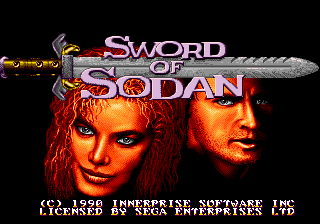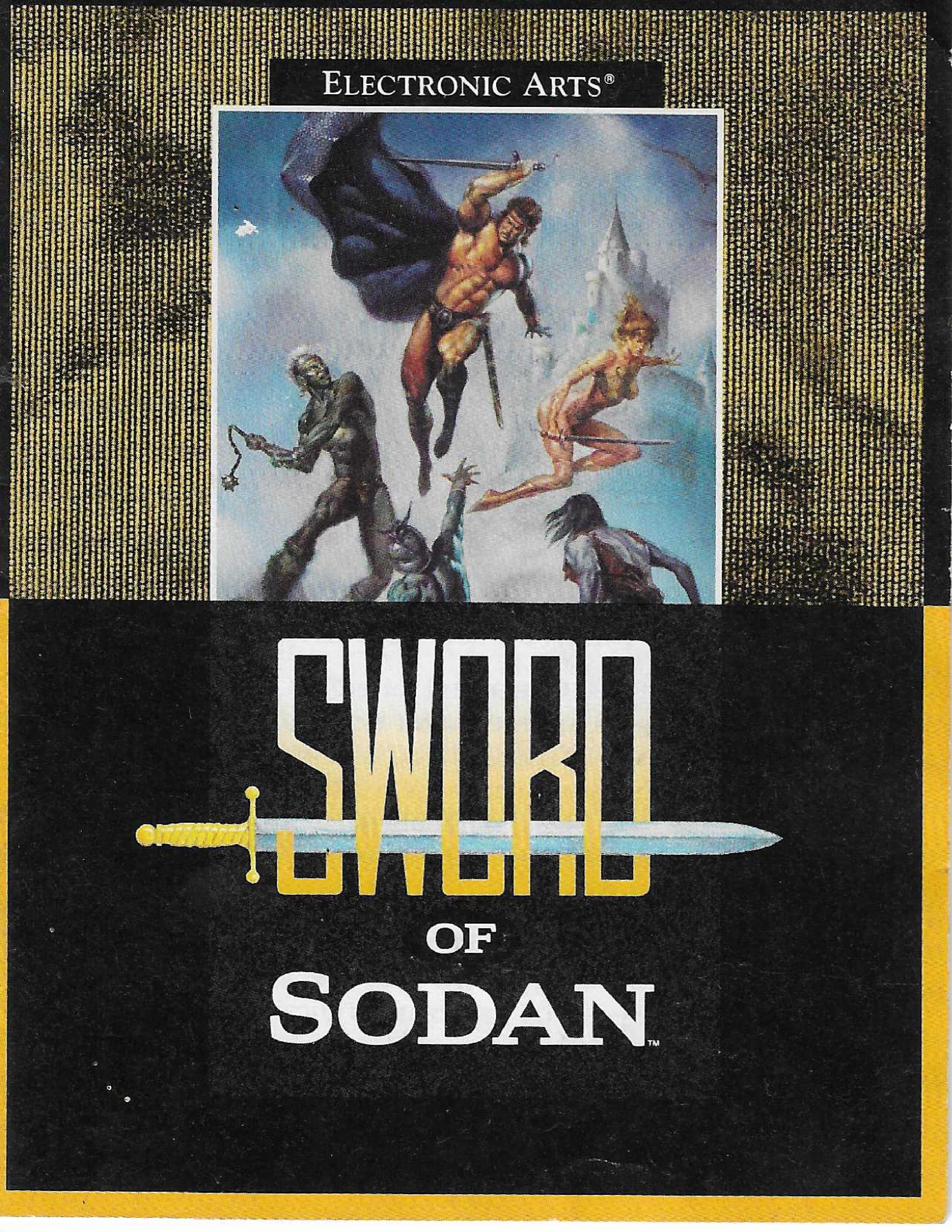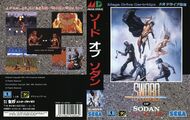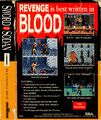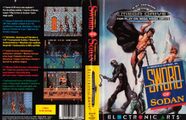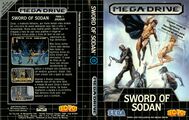Sword of Sodan
From Sega Retro
| Sword of Sodan | ||||||||||||||||||||||||||||||
|---|---|---|---|---|---|---|---|---|---|---|---|---|---|---|---|---|---|---|---|---|---|---|---|---|---|---|---|---|---|---|
| System(s): Sega Mega Drive | ||||||||||||||||||||||||||||||
| Publisher: Electronic Arts (US, Europe) Sega Enterprises, Ltd. (JP) Tec Toy (BR) | ||||||||||||||||||||||||||||||
| Developer: Innerprise Software | ||||||||||||||||||||||||||||||
| Distributor: Tec Toy (BR) | ||||||||||||||||||||||||||||||
| Original system(s): Amiga | ||||||||||||||||||||||||||||||
| Developer(s) of original games: Discovery Software International | ||||||||||||||||||||||||||||||
| Genre: Action[1][2] | ||||||||||||||||||||||||||||||
| Number of players: 1 | ||||||||||||||||||||||||||||||
| ||||||||||||||||||||||||||||||
|
This teeny-tiny article needs some work. You can help us by expanding it.
Sword of Sodan (ソード・オブ・ソダン) is a Sega Mega Drive linear beat-'em-up game developed by Innerprise Software. A port of the titular 1988 Discovery Software International game Sword of Sodan[8], it was first published in the United States by Electronic Arts in 1990, and saw European release the following January. Later in October 1991, it was brought to Japan by Sega themselves, and eventually saw a Brazilian release courtesy of publisher Tec Toy in April 1992.
Originally an Amiga game, Sword of Sodan is most notable for being one of the poorest received Mega Drive games ever released, and was consistently voted the system's single-worst game by readers of Beep! MegaDrive magazine.[9][10]
Contents
Gameplay
Sword of Sodan is a side-scrolling beat-'em-up where the player can control either an unnamed male or unnamed female, walking towards the right of the screen and hacking and slashing enemies along the way.
Being originally written for the Amiga, the control scheme of Sword of Sodan is built around one-button joysticks which were prevalent across home computing at the time. On the Mega Drive the main controls are split across ![]() and
and ![]() - jumping is assigned to
- jumping is assigned to ![]() (where holding down the button results in a higher jump), but is also used in conjunction with
(where holding down the button results in a higher jump), but is also used in conjunction with ![]() or
or ![]() to turn the character around.
to turn the character around. ![]() swings the character's sword, and combined with
swings the character's sword, and combined with ![]() ,
, ![]() and
and ![]() other attacks can be made.
other attacks can be made. ![]() crouches.
crouches.
The strength of the player's attacks depend on the current "HIT" value displayed on top of the screen, which decreases when losing a life. Attacks have very specific hit zones - spear wielding guards for example need to be attacked at point blank range, while giants can only be hurt by using high attacks.
![]() is used to drink potions dropped by defeated enemies. Potions are selected in the pause menu, and can be combined to create more interesting results.
is used to drink potions dropped by defeated enemies. Potions are selected in the pause menu, and can be combined to create more interesting results.
The game features an undocumented level skip in stage 5 - if the player deliberately falls down the third pit, they will skip directly to stage 6.
Potions
- Red: increases attack strength
- Orange: defeats the closest enemy
- Blue: restores health
- Transparent: no effect
- Red + transparent: extra life
- Orange + transparent: flaming brand (stronger sword with fire effect)
- Blue + transparent: temporary invincibility
- Red + orange: flaming brand (stronger sword with fire effect)
- Transparent x 4: skip stage
Other combinations either have no effect or are poisenous to the player.
Versions
Despite sharing a name, Sword of Sodan was significantly altered during its transition to the Mega Drive, putting more of an emphasis on potions while reducing the amount of content. Most of the graphics were re-drawn, with layouts also being modified and swordplay being tweaked. Enemies attack from both left and right (a feature missing in the Amiga version), however the ostrich-like creature in the dungeon stage is missing.
Some levels (such as the wood area) were removed, while others combined, bringing the total number of stages to eight. Five of the thirteen enemies seen in the Amiga version were removed also.
Neither version of Sword of Sodan has in-game music.
Production credits
- Game Design: Torbin Larsen, Anselm Hook, Soren Gronbech
- Game Graphics: Torbin Larsen, Matt Herczka, Sheryl Knowles
- Title Music: Jon Medek
- Producer: Christopher Erhardt
- Associate Producer: Roland Kippenhan III
- Product Management: Karen Schulman, Lesley Mansford
- Art Director: Nancy Fong
- Package Illustrator: Dorian Vallejo
- Documentation: Andrea Smith, Michael Humes, Robert Berg
- Documentation Layout: Jennie Maruyama
- Integration: Anselm Hook
- Quality Assurance: Kurtis Hsu
- Thanks to Martin Pedersen.
Magazine articles
- Main article: Sword of Sodan/Magazine articles.
Physical scans
| Sega Retro Average | |||||||||||||||||||||||||||||||||||||||||||||||||||||||||||||||||||||||||||||||||||||||||||||||||||||||||||||||||||||||||||||||||||||||||||
|---|---|---|---|---|---|---|---|---|---|---|---|---|---|---|---|---|---|---|---|---|---|---|---|---|---|---|---|---|---|---|---|---|---|---|---|---|---|---|---|---|---|---|---|---|---|---|---|---|---|---|---|---|---|---|---|---|---|---|---|---|---|---|---|---|---|---|---|---|---|---|---|---|---|---|---|---|---|---|---|---|---|---|---|---|---|---|---|---|---|---|---|---|---|---|---|---|---|---|---|---|---|---|---|---|---|---|---|---|---|---|---|---|---|---|---|---|---|---|---|---|---|---|---|---|---|---|---|---|---|---|---|---|---|---|---|---|---|---|---|
|
| 48 | |
|---|---|
| Based on 27 reviews | |
Technical information
- Main article: Sword of Sodan/Technical information.
References
- ↑ File:SoS MD JP Box.jpg
- ↑ 2.0 2.1 https://sega.jp/history/hard/megadrive/software.html (Wayback Machine: 2020-07-20 09:51)
- ↑ https://groups.google.com/g/rec.games.video/c/nIoj_nzYdTo/m/yy399PAfOlcJ
- ↑ 4.0 4.1 GamePro, "March 1991" (US; 1991-xx-xx), page 76
- ↑ Raze, "April 1991" (UK; 1991-02-28), page 49
- ↑ Sega Power, "March 1991" (UK; 1991-02-07), page 19
- ↑ Supergame, "Abril 1992" (BR; 1992-04-xx), page 45
- ↑ https://www.badgamehalloffame.com/sword-of-sodan/ (Wayback Machine: 2024-06-14 06:05)
- ↑ https://www.badgamehalloffame.com/xdr-x-dazedly-ray/
- ↑ https://mdshock.com/2018/09/16/osomatsu-kun-the-bizarre-story-of-the-mega-drives-most-infamous-game/
- ↑ File:SoS MD US Manual.pdf, page 15
- ↑ 1700 igr dlya Sega, "" (RU; 2001-xx-xx), page 233
- ↑ Aktueller Software Markt, "März 1991" (DE; 1991-02-22), page 116
- ↑ Beep! MegaDrive, "October 1991" (JP; 1991-09-07), page 36
- ↑ Console XS, "June/July 1992" (UK; 1992-04-23), page 135
- ↑ Cool Gamer, "9" (RU; 2002-10-13), page 215
- ↑ Computer & Video Games, "March 1991" (UK; 1991-02-16), page 88
- ↑ Mean Machines: The Essential Sega Guide, "" (UK; 1993-11-18), page 103
- ↑ Famitsu, "1991-10-18" (JP; 1991-10-04), page 1
- ↑ Génération 4, "Février 1991" (FR; 1991-xx-xx), page 101
- ↑ Hippon Super, "November 1991" (JP; 1991-10-04), page 91
- ↑ Joystick, "Février 1991" (FR; 1991-0x-xx), page 113
- ↑ Sega Mega Drive Advanced Gaming, "November 1992" (UK; 1992-xx-xx), page 79
- ↑ Sega Mega Drive Advanced Gaming, "January 1993" (UK; 199x-xx-xx), page 94
- ↑ Mega Drive Fan, "January 1992" (JP; 1991-12-07), page 101
- ↑ Mega Play, "February 1991" (US; 199x-xx-xx), page 45
- ↑ MegaTech, "Xmas 1991" (UK; 1991-12-06), page 81
- ↑ Mean Machines, "February 1991" (UK; 1991-02-01), page 78
- ↑ Mean Machines Sega, "October 1992" (UK; 1992-09-xx), page 142
- ↑ Power Play, "4/91" (DE; 1991-03-15), page 135
- ↑ Raze, "April 1991" (UK; 1991-02-28), page 48
- ↑ Sega Power, "October 1991" (UK; 1991-09-05), page 54
- ↑ Sega Power, "March 1991" (UK; 1991-02-07), page 18
- ↑ Sega Pro, "April 1993" (UK; 1993-03-11), page 68
- ↑ Sega Saturn Magazine, "September 1995" (JP; 1995-08-08), page 87
- ↑ Tricks 16 bit, "Tricks Sega Gold 800 igr" (RU; 1998-03-20), page 192
- ↑ VideoGames & Computer Entertainment, "March 1991" (US; 1991-0x-xx), page 44
| Sword of Sodan | |
|---|---|
|
Main page | Maps | Hidden content | Magazine articles | Reception | Region coding | Technical information | Bootlegs | |
